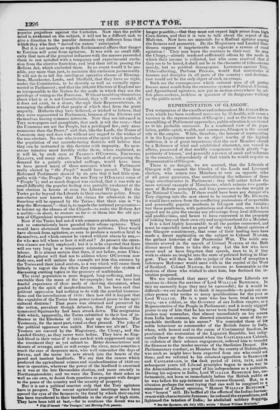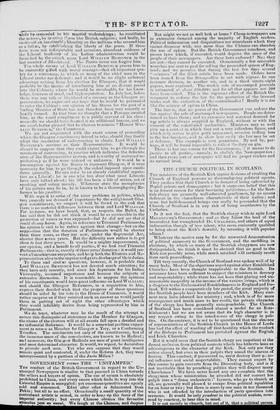REPRESENTATION OF GLASGOW.
THE resignation of the excellent and independent Mr. COLIN DUN- LOP, which has been rendered necessary by ill-health, will cause a vacancy in the representation of Glasgow ; and as the time for the assembling of Parliament approaches, public attention is awakened as to his probable successor. In a combined view of its popu- lation, public-spirit, wealth, and commerce, Glasgow is the second city in the empire. While, therefore, the honour of representing it in the Legislature must be an object worthy of the highest ambition, it is of great importance that the new Member should be a Reformer of tried and established character, one versed in affairs, possessed of that worldly competence which giveth "op- portunity of leisure," and generally a person of mark and influence in the country, independently of that winch he would acquire as Representative of Glasgow.
There is no danger, we are assured, that the Liberals of Glasgow will commit the blunder of the Leeds and Liverpool electors, who return two Members to vote on opposite sides of all great questions, thus neutralizing the influence of those large constituencies in Parliament: they will rather follow the more rational example of Manchester, which returns two gentle- men of Reform principles, and thus possesses its due weight in the National Councils. If there could have been any danger of a Tory slipping into the seat about to be vacated by Mr. DUNLOP, it would have arisen from the conflicting pretensions of respectable and personally popular residents in Glasgow and the vicinity; but these gentlemen, with patriotism and discretion, seem to have agreed not to give the enemy any advantage from local differences and predilections, and hence to have concurred in the propriety of looking beyond their own city and neighbourhood for a Member. It is a fact highly honourable to all the parties concerned, and must be especially noted as proof of the very Liberal opinions of the Glasgow constituency, that some of their leading men have made a direct application on the subject to Colonel NAPIER, the gallant historian of the Peninsular War. The noble sen- timents avowed in the speech of Colonel NAPIER at the Bath dinner moved them to take this step. Let the few who have never read or have forgotten that speech, turn to it, if they wish to obtain an insight into the state of political feeling in Glas- gow. They will then be able to judge of the kind of reception a lukewarm Reformer would meet with in the capital of the West of Scotland. Colonel NAPIER, for reasons as honourable as the motives of those who wished to elect him, has declined the in- vitation proposed. We are informed that many of the Glasgow Liberals are anxious to obtain the services of Lord WILLIAM BENTINCIC In this we earnestly hope they may be successful ; for it would be difficult—we are inclined to think it impossible—to point out an- other person who unites so many qualifications for the post as Lord WILLIAM. He is a man who has been tried in various ways,--as a soldier, as the Governor of our Indian empire, as a Representative of the People in Parliament; and it is only niggard praise to say of him that he has never been found wanting. Our readers may remember, that almost immediately on his return from India last summer, we directed attention to some of the re- markable incidents in his career.* We reminded them of his noble behaviour as commander of the British forces in Italy, when, with honest zeal in the cause of Continental freedom, he proclaimed the restoration of the Ligurian Republic, but indig- nantly threw up the command when the CASTLEREAGH Cabinet, in violation of their solemn engagement, ordered him to transfer the Genoese to the tender mercies of the Sardinian Despot. His Parliamentary conduct, as Member for the county of Nottingham, was such as might have been expected from one who could act thus; and we referred to his constant opposition to Simmers:a and CASTLEREAGH, in the dark period of 1818, 1819, and !ti subsequent years till Liberal principles began to make way in the Administration, as a proof of his independence as a politician. During his sojourn in India, Lord WILLIAM BENTINCIL has, un- fortunately, not been so immediately before the British public as Ile was before his appointment as Governor-General. But, in a situation perhaps the most trying that can well be imagined to 11,, statesman of Liberal opinions, " Honest WILLIAM BENTINCL was " honest" still. He baffled all the efforts of thelndian bureau- cracie with characteristic firmness; he reduced the expenditure, and lightened the taxation of India; he abolished military flogging, • Bee the Spectator, ath July 1835 article " Honest William Bentinclu" 'while he sseceeded in his 'tartlet undertakings ; he conciliated the natives, by treating tl.teni like British subjects ; and lastly, he conferred an inestimahls: blessing on the millions who revered him as a fatl.er, by cstabl:sh;ing the liberty of the press. If these facts were not indisputable and notorious, abundant evidence of the Liberal tendency of his Indian administration would be furnished by the attack upon Lord WILLIAM BENTINCK in the last number of Binekteoncl. The Tories- never can forgive him. The whole career of Lord WILLIAM BENTINCK proves him to be eminently gifted with moral courage—that all-important qua- lity !Ur a statesman, in which so many of the chief men in the Liberal ranks are deficient : and it would be no slight collateral advantage ari:sing from his election for Glasgow, that it would probably be the means of introducing him at no distant period into the Cabinet; where he would be invaluable, for his know- ledge, firmness of mind, and high reputation. in July last, before there was any talk er likelihood of a vacancy in the Glasgow re- presentation, we expre,sed our hope that he would be persuaded to enter the Cabinet : our opinion of his fitness for the post of a leading Minister of State has not therefore been very recently or hastily formed. At that time we thought that a Peerage awaited him, as the usual compliment to a public servant of his class : assuredly we should have deemed it no additional honour, and we are much better pleased that he chooses to remain " Honest WIL- MA:VT BENTINCK," the Commoner.
We are not acquainted with the exact course of proceeding which the Glasgow constituency intend to take, should they finally adopt the resolution of endeavouring to obtain Lord WILLIAM
BENTINCK'S services as their Representative. It would be absurd to suppose that they could expect him to go through the ceremony of canvassing, (a practice which indicates the defective state of the Representative system, and is worthy of universal re- probation,) as if lie were untried or unknown. It would be a presumption against his fitness to represent Glasgow, if it were necessary for him to go through the ordeal imposed upon candi- dates generally. He can refer to an already established reputa- tion as a Libel al ; he is one who has done what most Liberals have only talked about ; his life has been a life of action, not of speaking and voting merely. Whatever state the metaphysics of his politics may be in, he is known to be a thoroughgoing Re- former in his practice._ With rega:d to some of the nicer problems in politics, which very- properly are deemed of importance•by the enlightened Glas- gow constituency, we suspect it will be found in the end that there is no material difference between them and Lord WILLIAM. For instance, we have heard, that, as respects the Ballot, he has said that he did not think it wouid be so serviceable in the protection of voters as was supposed—but be did not see that it could do any harm. Again, in reference to Triennial Parliaments, his opinion is said to be rather against that change—but on the supposition that the duration of Parliaments would be shorter than three years, as they are now, under the Septennial Act, shorter than seven years. But the difficulty now rather is to get Mein to last three years. It would be a mighty improvement, in our opinion, and a benefit to all parties, if we had real Triennial Parliaments--that is, exactly of three years' duration : it would pre- vent all mischievous surprises, and keep both the Electors and Re- presentatives alive to the regular andgrave discharge of their duties.
To these and simirar questions, however, it is probable that Lord WILLIAM BENTINCK has not devoted much attention; for they have only recently, and since his departure for his Indian Viceroyalty, assumed importance and become the subjects of extensive discussion. It is reasonable to suppose the opinions of his constituents would have great influence on Lord WILLIAM; and should the Glasgow Reformers, in a requisition to him, express their decided wish that the progress of these questions should be aided by his vote in the House of Commons, it would rather surprise us if they received such an answer as would justify them in putting out of sight the other advantages which they would infallibly derive from being represented by him in Parliament.
We do trust, whatever may be the result of the attempt to secure this distinguished statesman as the Member for Glasgow, the choice of the electors will at all events fall upon a decided and an influential Reformer. It would be a somewhat perilous experi- ment to return as Member for Glasgow a Tory, or a Conforming Trimmer. The sentiments not only of the constituency, but of the immense mass of the non-electors, are known to be Radical ; and moreover, the Glasgow Radicals are men of great intelligence and most determined character. It would, we repeat, be hazardous to provoke .such men. Yet who can suppose that they would retrain quiet and contented, if, under the Reform Act, they were misrepresented by a partisan of the Juste



























 Previous page
Previous page